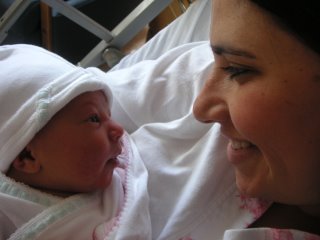Monday, August 28, 2006
Loving you is easy....

This past weekend my boyfriend and I babysat my beautiful, tiny 4 month-old niece on Saturday night and she was perfect! No screaming or crying for four hours, nothing but smiles and playing and I think we love her even more! So I am dedicating this post to her, and I intend to write a bit about the chemicals that make us love babies, and make babies love us, and how mothers and babies can help promote each other’s health just by being near. (This picture is my sister and my niece about 18 hours after she was born in May)
There is a hormone called ‘oxytocin’ that has been associated with love, not just the love we feel for tiny babies, but also romantic love, particularly for those of us mammals who are monogamous (a mere 5%).
For mothers and babies, oxytocin plays a special role. In women, oxytocin levels rise even during pregnancy, turning us literally into maternal creatures. As the baby arrives, oxytocin stimulates uterine contractions as well as the secretion of breast milk and it is used clinically in labor and delivery. And when mothers hold their babies, particularly tiny ones (under 5 months), their oxytocin levels increase, and their blood pressure goes down. When mother holds child, not only does oxytocin kick in for both of them, but so does dopamine, a powerful dose of pleasure in the brain.
As it turns out, we don’t just crave maternal contact, we actually need it.
The same effects happen when couples spend time together too, with a direct link between levels of oxytocin, and physical contact between couples; such as hugging or holding hands. The good news for women is that these rises in oxytocin cause decreases in blood pressure as well as decreases in the stress hormone norepinephrine. And guess what? The same effects don’t happen in men.
I suppose this explains my wonderful weekend; between my niece and my man I was swimming in dopamine.